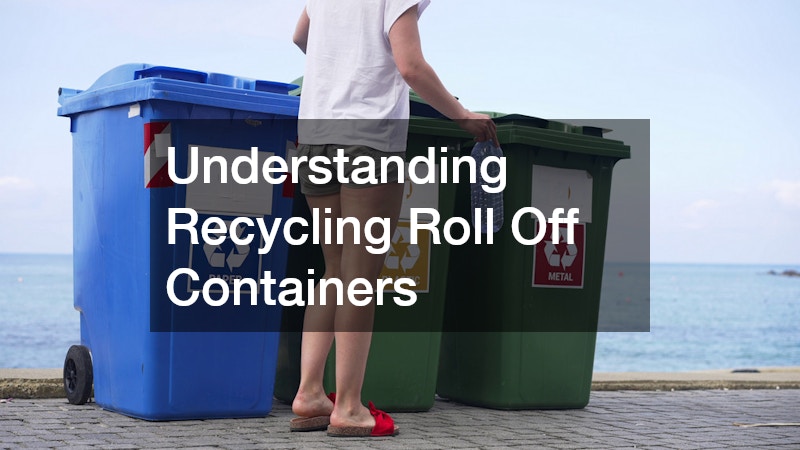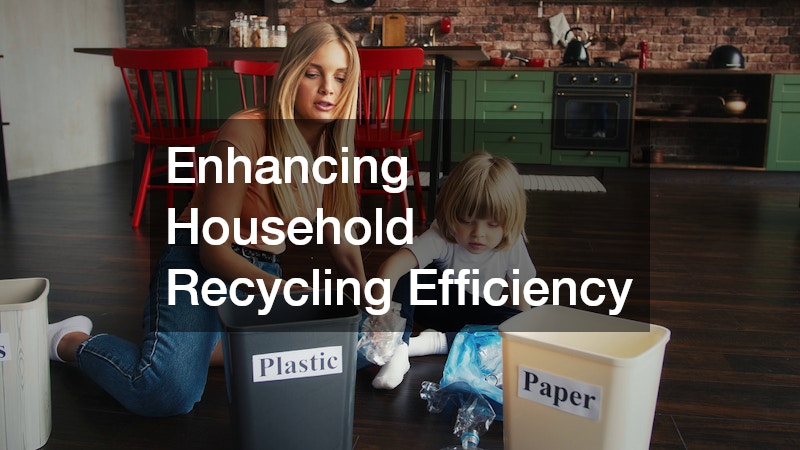
Sustainability has become a central focus in many aspects of our lives, including homeownership. As individuals and families make efforts to live more responsibly, homeownership can play a pivotal role in fostering a cleaner, greener future. One of the best ways to do this is through conscious waste management practices, particularly by using tools and services that contribute to efficient recycling. Among these, recycling roll off containers are an invaluable resource. They not only provide a convenient and organized way to manage waste but also ensure that materials are disposed of in an environmentally friendly manner. Understanding the connection between sustainable practices and homeownership allows homeowners to take practical steps toward reducing their ecological footprint.
Understanding Recycling Roll Off Containers

Recycling roll off containers offer a practical and eco-friendly solution for managing large volumes of waste, particularly during home renovations, cleanouts, or seasonal maintenance projects. These sturdy containers are built to accommodate everything from broken furniture to construction debris, giving homeowners a reliable way to separate recyclable materials from general trash. By choosing appropriately sized containers, which are often available through local dumpster rentals, homeowners can tailor their waste management approach to the scale of their project.
In terms of practical application, recycling roll off containers are ideal for handling waste generated from a variety of household projects. For example, during a home renovation, items such as drywall, wood, and metal hardware can be sorted directly into a designated recycling container rather than mixed with landfill-bound waste. Similarly, during a thorough yard cleanup, homeowners can use these containers to gather recyclable outdoor materials like fencing or tools. The ability to coordinate these efforts through local dumpster rentals adds to the convenience, allowing homeowners to manage debris sustainably without disrupting their daily routines.
Promoting Waste Reduction at Home
Reducing waste at home is one of the most direct ways homeowners can contribute to environmental sustainability. By embracing practices that limit waste generation, homeowners can reduce their consumption and decrease the amount of trash sent to landfills. This includes everything from purchasing items with less packaging to choosing products made from recyclable or reusable materials. In addition to these choices, setting up systems for sorting waste can encourage better recycling habits.
For homeowners looking to take a more active role in reducing waste, working with local services is often the next step. One specific service that can help is local landscaping companies. These businesses often provide assistance with yard waste removal and may also help homeowners find ways to compost or recycle organic materials. Whether it’s removing tree branches or offering guidance on how to best dispose of yard debris, local landscaping companies can ensure that waste doesn’t unnecessarily accumulate in landfills. Additionally, these services often offer eco-friendly practices, like mulching, that support sustainable living. When combined with the use of recycling roll off containers for general waste management, homeowners can adopt a comprehensive approach to reducing waste and promoting sustainability across multiple facets of homeownership.
Supporting Eco-Friendly Renovation Projects
Home renovations are an exciting way to breathe new life into a home, but they can also generate significant amounts of waste. One of the challenges many homeowners face during renovations is how to manage this waste sustainably. Eco-friendly renovations focus on minimizing waste production and using materials that have a lesser environmental impact. This can include choosing reclaimed wood, using low-impact paints, and recycling construction debris. Properly managing the waste from renovation projects ensures that recyclable materials are diverted from the landfill and reused, contributing to a more sustainable living environment.
For homeowners taking on a renovation project, roofers can play a key role in reducing the environmental impact of roofing jobs. Replacing an old roof, for example, often involves removing shingles, insulation, and other materials that are traditionally sent to landfills. However, many roofing companies now partner with recycling services that specialize in reclaiming materials like asphalt shingles for reuse. A roofer who offers eco-friendly disposal options ensures that recyclable materials are properly sorted and sent to appropriate facilities. When combined with the use of recycling roll off containers, homeowners can easily separate materials for recycling, making it easier for the whole renovation process to stay aligned with sustainability goals.
Enhancing Household Recycling Efficiency

Increasing the efficiency of recycling at home is essential for reducing waste and ensuring that materials are disposed of in the most sustainable manner possible. One of the most effective ways to enhance recycling efforts is by creating designated spaces for different types of recyclable materials. These spaces help reduce contamination, making it easier to separate recyclables such as paper, plastics, metals, and glass. With the proper systems in place, homeowners can easily sort materials before placing them in a recycling roll off container, leading to more effective recycling practices.
One specific service that can help improve the efficiency of recycling efforts is septic system cleaning. While this may not directly seem related to recycling, maintaining a clean and functional septic system plays an indirect role in ensuring a cleaner environment. Proper septic maintenance helps prevent system failures that could lead to contamination of local water sources, including runoff from household waste. By choosing a reliable septic system cleaning service, homeowners can ensure that their septic systems are working optimally, avoiding environmental contamination that could impact the broader ecosystem.
Reducing Landfill Contributions Responsibly
Reducing the amount of waste sent to landfills is one of the most important steps homeowners can take toward living more sustainably. Landfills are a significant source of greenhouse gas emissions, especially methane, which is a potent contributor to climate change. By diverting recyclable and compostable materials away from the landfill, homeowners can help reduce these harmful emissions. Waste reduction efforts can include strategies such as donating items that are still in good condition, reusing materials wherever possible, and participating in local recycling programs.
One way to ensure that waste is handled responsibly is by utilizing concrete coring services when undertaking construction or renovation projects. When demolishing or cutting through concrete, many materials, such as rebar and old concrete pieces, can be recycled instead of going to the landfill. Concrete coring services help homeowners extract these materials in a way that makes them easier to recycle. Instead of simply throwing away concrete rubble, these materials can be processed and repurposed, often as aggregates in new construction projects.
Encouraging Sustainable Disposal Habits
Promoting sustainable disposal habits is key to minimizing waste and supporting a circular economy. Sustainable disposal practices involve more than just throwing items away; they include making conscious choices about how to handle waste and where it goes. This can mean repurposing items instead of discarding them, donating goods that are still usable, and making use of recycling programs to ensure that recyclable materials do not end up in the landfill. By establishing clear disposal guidelines at home and encouraging family members to follow them, homeowners can reduce their waste output and contribute to a more sustainable future.
One way to support sustainable disposal is by working with moving services. When homeowners are preparing to relocate, moving often generates a large amount of waste, such as old furniture, packaging materials, and unwanted household items. A moving service that prioritizes eco-friendly practices can help homeowners dispose of these items in a sustainable way. Many moving companies now offer recycling options for materials like cardboard, plastic, and metal, ensuring that these items are recycled rather than thrown away. Furthermore, some moving services may even provide donation services for gently used furniture and clothing, ensuring that items find a new home instead of ending up in the trash.
Simplifying Home Cleanouts Sustainably

Home cleanouts can often feel like overwhelming tasks, especially when there are years of accumulated items to sort through. However, these cleanouts can also be an excellent opportunity to embrace sustainability by reducing clutter and properly disposing of unwanted items. Sustainable cleanouts involve systematically sorting through belongings, identifying what can be recycled, donated, or reused, and properly handling the rest. Rather than simply tossing everything into the trash, homeowners can ensure that recyclables are placed in a recycling roll off container, and items like old clothing, electronics, or furniture are donated to local charities or repurposed. These efforts help keep landfills from filling up with unnecessary waste and ensure that usable goods are given a second life.
For homeowners looking to make their cleanouts even more sustainable, local storage units can be a helpful tool. When cleaning out a home, it can be difficult to decide what to keep and what to get rid of, especially when certain items may still have sentimental value or potential future use. Renting a local storage unit allows homeowners to temporarily store these items until they make a final decision, without the immediate pressure to dispose of them. Additionally, these storage units can be used to organize and separate items that are destined for donation, recycling, or reuse.
Managing Construction Debris Mindfully
Construction projects, whether large or small, often generate significant amounts of debris. Properly managing this debris is crucial not only for the success of the project but also for the environment. Mindful debris management involves carefully sorting construction materials, recycling metals, wood, and other materials whenever possible, and ensuring that waste is disposed of in a responsible way. Using recycling roll off containers for the collection of recyclables makes the process much easier and ensures that materials are diverted from the landfill to be repurposed and reused in new construction projects or other industries.
One service that can help with mindful construction debris management is structural engineering. Structural engineers often work closely with contractors to plan and manage the materials used in construction projects. They can also help identify which materials are reusable or recyclable and assist in designing projects with sustainability in mind. In many cases, structural engineering firms can recommend the use of sustainable materials and ensure that the waste generated during construction is handled efficiently.
Lowering Environmental Impact Through Recycling
Every action taken to reduce environmental impact counts, and recycling is one of the most effective ways to lessen the strain on our planet’s resources. Recycling reduces the need for new raw materials, conserves energy, and prevents pollution. By incorporating recycling practices into daily life, homeowners can significantly contribute to a more sustainable world. Using a recycling roll off container for large projects or seasonal cleanouts ensures that recyclables are collected in a dedicated space and handled responsibly, making the process more efficient.
One example of a service that supports this effort is sealcoating. While it may seem unrelated to recycling, sealcoating plays a role in maintaining surfaces like driveways or parking lots, which can be a source of runoff and waste if left unmanaged. Proper maintenance and sealcoating can extend the life of these surfaces, reducing the need for new materials and preventing the need for costly replacements that would generate waste. Furthermore, some sealcoating materials themselves are made from recycled products, such as reclaimed asphalt, which helps close the loop in a sustainable manner.
Aligning Homeownership With Green Values

Homeownership provides a unique opportunity to implement sustainable practices and live in alignment with personal values about environmental stewardship. From selecting energy-efficient appliances to installing solar panels, there are many ways homeowners can make their properties more eco-friendly. Sustainable homeownership extends beyond these energy-saving initiatives and also involves adopting responsible waste management practices, such as recycling, composting, and reducing unnecessary consumption.
A critical component of this green approach is the support of services like utility tree services. Trees not only provide aesthetic value and natural shade, but they also play a significant role in energy conservation by reducing the need for air conditioning in the summer. By working with a tree service to maintain trees near the home, homeowners can ensure that they are properly cared for and positioned to maximize energy savings.
Adopting sustainable practices in homeownership is not only beneficial to the environment but also an important step toward reducing waste and promoting a healthier planet. By utilizing tools like recycling roll off containers, homeowners can take a proactive approach to waste management, ensuring that materials are disposed of responsibly and contributing to a circular economy. Whether it’s through eco-friendly renovation projects, efficient recycling, or mindful disposal of construction debris, each effort plays a crucial role in lowering environmental impact. Working with specialized services like roofers, septic system cleaning, or local landscaping companies can further support sustainability efforts.